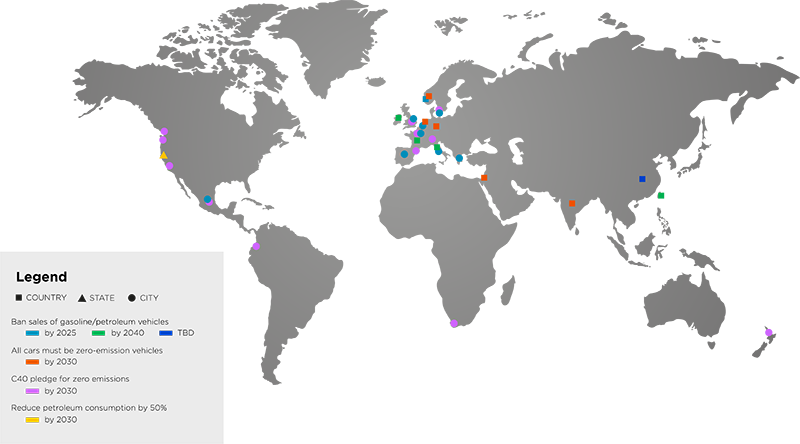Worldwide Commitments
Commitments to Adopting Zero-Emission Technologies and Reducing Petroleum Consumption
in California and Around the World
In California, the following zero-emission technology and petroleum goals have been identified by Governor Brown and other state and local agencies:
In 2015, Governor Brown identified reducing petroleum use in cars and trucks by up to 50 percent by 2030 as one of the key climate change strategy pillars needed to reduce emissions to meet the 2030 greenhouse gas emissions target.
Assembly Bill 739 requires that 30 percent of newly purchased vehicles by state agencies be zero emission by 2030.
The California Air Resources Board is in the process of proposing a goal of achieving a zero-emission transit system by 2040 and a goal of replacing existing diesel airport ground support equipment with zero-emission equipment by 2032.
The San Pedro Bay Ports Clean Air Action Plan 2017 requires that, beginning in 2035, all trucks entering the port must be zero-emission or pay a fee.
In 2012, Governor Brown issued Executive Order B-16-12 directing state government to help accelerate the market for zero-emission vehicles (ZEVs) in California and calling for 1.5 million ZEVs in California by 2025.
The California Sustainable Freight Action Plan has set a goal of transitioning to zero-emission technology by deploying over 100,000 freight vehicles and equipment capable of zero-emission operation, and by maximizing near-zero emission freight vehicles and equipment powered by renewable energy by 2030.
The Bay Area Plug-In Electric Vehicle Readiness Plan (2013) established goals of 110,000 EVs on Bay Area roads by 2020, and 250,000 EVs by 2025. The Bay Area Air District’s 2017 Clean Air Plan has set a longer-term goal of 90 percent of the Bay Area fleet being zero-emission by 2050.
These efforts in California augment those of cities and countries around the world who have taken action to dramatically reduce climate pollutants:
Athens, Madrid, Mexico City, Paris, and Norway have set a goal of banning sales of petroleum-fueled vehicles by 2025.
The Netherlands, Germany, India, and Ireland have required that all cars must be ZEVs by 2030.
Israel will ban the use of gasoline and diesel by 2030.
California has pledged to reduce petroleum consumption by 50 percent by 2030.
China plans to ban sales of petroleum-fueled vehicles by a date still to-be-determined.
The mayors of the following cities have signed the C40 Fossil-Free Streets Declaration, pledging to transition to Fossil-Free Streets by procuring only zero-emission buses from 2025 and ensuring that a major area of their city is zero emission by 2030: Paris, London, Los Angeles, Copenhagen, Barcelona, Quito, Vancouver, Cape Town, Seattle, Mexico City, Auckland, Milan, Rome, and Heidelberg.
Britain and France plan to ban sales of petroleum-fueled vehicles by 2040.
 BAAQMD
BAAQMD